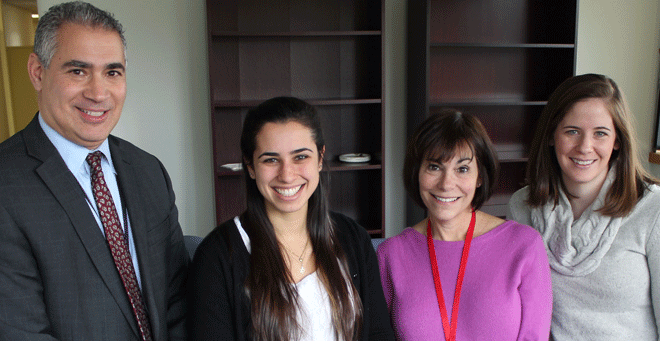 |
|
|
David Smelson, PsyD; Rachel Rosen, clinical research assistant; Elizabeth Epstein, PhD; and Cassie Holzhauer, PhD, postdoctoral fellow. |
Active members of the military, veterans and their families face unique challenges at home after deployment. Excessive alcohol use may mask other emotional and physical struggles, such as depression, pain, trauma, isolation and anger, all of which can get in the way of creating a “new normal,” according to psychologists at UMass Medical School.
Two faculty members with backgrounds in alcohol use treatment and also in military culture are developing a confidential therapeutic program called Alcohol Behavioral Couple Therapy to help military personnel manage challenges and re-entry into civilian life. The work is being funded, in part, by a $750,000 grant from the National Institute on Alcohol Abuse and Alcoholism.
“Taking standard treatment and applying it to the veteran population is often not effective,” said David Smelson, PsyD, professor of medicine. “There really is not a specialized alcohol treatment developed specifically for service members and their families. What we’re doing is developing a new, military-centric intervention model.”
The program is based on an established, evidence-based therapy, developed and tested for the civilian population by Elizabeth Epstein, PhD, professor of psychiatry, and colleagues, over 26 years while she was a research professor at Rutgers University Center of Alcohol Studies.
"Alcohol use in military populations can be associated with many other issues related to mood, post-traumatic stress, traumatic brain injury and relationship problems. We can’t resolve all of those issues in 15 sessions with the couple, but we can help them start to untangle these challenges. We start with the alcohol to try to take that out of the equation, which allows the couple to see the other things more clearly. The end goal is to help the couple and family create a new normal,” Dr. Epstein said.
About 38 percent of the 2 million soldiers who served in military operations in the Middle East since 2001 report alcohol-related problems. Binge drinking (more than 4 standard drinks on one drinking occasion) among military personnel has increased from 38 percent to 47 percent in the past 10 years, according to research by the Institute of Medicine and others.
Of those military members who report such problems, many have experiences with domestic violence (50 percent); suffer from depression and/or suicidal thoughts (25 percent); meet the criteria for Post-Traumatic Stress Disorder (31 percent); and 19 to 22 percent have traumatic brain injury, according to various studies cited in the NIAAA grant applications.
Epstein and Dr. Smelson believe that adapting the Alcohol Behavioral Couple Therapy approach to suit service members’ needs post-deployment will result in greater success in treatment.
“The model is inherently targeted for the couple relationship,” Epstein said. “It focuses on coping skills and intervention for the drinker to stop or reduce drinking. For the spouse or partner (including in dating relationships), it teaches skills to help the drinker stop drinking and for the partner to help and to understand how hard it is to stop and generally cope.”
The goals of the therapy are to treat a service member or veteran’s alcohol dependence via alcohol-related interventions, and to repair and enhance the couple’s relationship. The therapy includes a set of optional modules that focus on couple conflict resolution and violence; suicidal ideation and depression; PTSD; chronic pain, and traumatic brain injury as a means to enable the service member or veteran and the couple to better recognize and understand the symptoms, which might be masked by the alcohol use.
Smelson and Epstein are recruiting military personnel and their significant others to be part of the program through a partnership with the Statewide Advocacy for Veterans’ Empowerment program, the Massachusetts Department of Veterans’ Services and the Massachusetts National Guard. The UMMS team is also partnering with the state Department of Veterans Services.
Interested couples will be screened over the phone and then given a confidential in-person assessment and feedback about whether this program may be helpful to them, If so, the couple will receive 15 weekly sessions with a highly trained clinician to address drinking, coping skills and relationship issues.